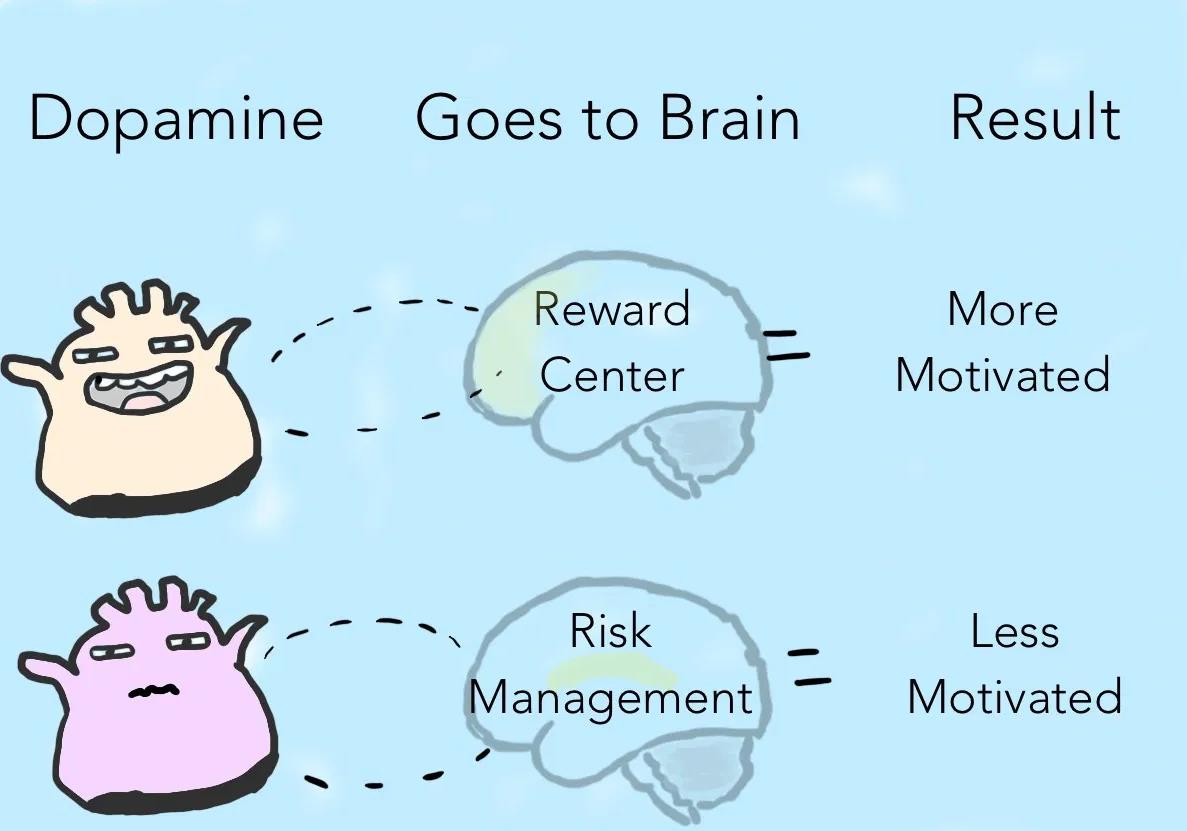
Exams and tests are approaching, but you can’t make yourself get down to work? It’s just like you don’t feel like it at all. Studying and figuring out the can often feel overwhelming, so it’s not easy to stay motivated.
Sounds familiar? These are the signs of a motivation crisis that every hard-working student can experience. But what can you actually do to stop procrastinating?
Read this article where you’ll find some effective strategies that many successful students use to motivate themselves to study.
The Science of Motivation
It’s all about the processes that happen in your head. When you complete a certain action, and it makes you feel good, your brain releases dopamine, a chemical that gives us a sense of pleasure. This neurotransmitter is actually responsible for our ability to be motivated and repeat the behavior. But the problem is that things that make us feel good are not always what we would like to be doing.

Source
And the thing about study in college is that it takes a lot of time. You have to wait for your grades without external rewards, and it often seems like forever. That’s why many students tend to distract themselves with other non-study related activities like posting on Instagram or having a night out with friends that will deliver a faster hit of dopamine.
Set Clear Goals

Source https://www.ntaskmanager.com/blog/short-term-goals
One of the best ways to stay motivated is to have a good understanding of why you are studying in the first place. You should set yourself well-thought goals and objectives. You can create short-term goals (e.g. pass an exam or learn the guide to creative writing) and long-term goals (e.g. specific achievements you want to reach while you study in college). To make your ultimate goal achievable and realistic, you should break it down into smaller goals or chunks.
If you provide more details for your goals, it will be easier for you to keep them in mind. Objectives will help you stay focused, increase your perseverance, and inspire you to strive for excellence. This way, you will be able to reach your true potential.
Follow these tips to set your goals effectively:
- Set realistic personal goals and write them down
- Avoid being vague; use numbers and deadlines and don’t use negations and necessities
- Break down complex goals into sub-goals and main targets
- Set goals that you can achieve and set clear deadlines
- Visualize how’ll feel when you accomplish your objectives
Make a schedule
It’s always easier to stay motivated if studying becomes an essential part of your everyday life. After you set your goals, it’s time to make a schedule to help you achieve them. You should create a timetable that can help you be on track. It’s important to schedule a specific time in your day when you have to sit down to study. Then it will become a concrete task, and you’ll be less likely to put it off.
You can also make weekly or even daily schedules and split hours of study into short, manageable sessions and plans break between them. For example, you may schedule a 5-minutes break after each hour of your work on social media research paper topics to check your social media and longer breaks after several hours of work. You can use these breaks to have something to eat or to go out for some fresh air.
Create a Reward System
Rewards can become when you are really not in the mood to study. As you set your specific goal, you should also determine an appropriate immediate reward for yourself once you accomplish the objective. Pick any reward that you will really enjoy. For example, you can promise yourself a 2-hour walk after finishing a challenging essay. Here is why.
When you get an immediate reward after a goal has been achieved, your brain elicits positive emotions. Then your mind will start linking hard work with positive experience and gratification. After that, you’ll start associating new challenges as one more chance to be rewarded.
That will increase your motivation to study and allow it to stay motivated until you accomplish the objective. But remember that you can’t reward yourself if you fail to achieve your goal. Recent studies show that frequent rewards for completing tasks really work and can boost motivation and performance. So you should always reward yourself immediately even if it’s a bar of chocolate or your favorite soap on TV.
Just Get Started
You should start studying no matter what. The hardest part is starting, so you might even have to force yourself and start with the easiest task, especially if you feel tired or if the study topic is boring or too complex. This way, you’ll get rid of negative thoughts about being lazy, and just after a few minutes, you’ll get used to your task and will want to do more.
Stay Positive
Your mindset and attitude toward your college can have a big impact on your motivation. If you think about your college as a place where you experience daily stress and anxiety, it won’t help you to stay motivated. But if you think about studying at college as a chance to grow as a person and learn something new, it can boost your motivation and increase your productivity.
Positive thinking will help you learn and become a successful student. While studying may not be at the top of your list of fun things to do, if you have a positive attitude, you can increase your chances of sticking to your study schedule and performing well in your exams.
Remember Your Why
Find the important reason why you want to succeed in your studies. That means you should focus on finding a higher purpose of getting an education. Do you do it because you think it’s interesting? Do you want to prove to yourself you can complete this difficult course? Do you want to make your parents proud of you? Do you want to earn a degree that will help you get a dream job?
If you know why you do it and what you want to achieve in life, it will be easier to overcome any obstacles, including a lack of motivation. Just remind yourself about your reason every time you don’t feel like studying.
Structured Procrastination
Why not use your love for procrastination to get things done? College students who often procrastinate, typically complete easy or ordinary tasks and postpone more complicated, bigger projects. But they may have the motivation to complete complex and important assignments if that helps them avoid working on something more complicated. If you want to use this approach, you should prioritize tasks that require more effort than studying when making a list of things to be done. After that, you’ll consider studying a less complicated task, and you’ll be more willing to do it.
Use Pomodoro Technique

Source https://medium.com/the-crossover-cast/the-pomodoro-technique-the-tomato-inspired-productivity-philosophy-ad3ba4cb2cfe
This technique makes work manageable and helps overcome your resistance to studying. It was created just to help you get started, and it is very simple. You just need to set your timer for 25 minutes and work on your assignment during that time. Then you should take a short break of 5-10 minutes. You need to repeat this cycle 4 times. Finally, you can take a longer break. Create a calm study space

Source https://www.pinterest.com/pin/619948704930075719
You should have a quiet space that you use only for working on your assignments without any potential distractions. It’s a very important aspect that can help improve your motivation. That’s why it should be a place that will encourage you to get your work done. You can use a desk in your bedroom or a kitchen table, and you should keep it tidy and free of clutter. You may also experiment with lighting. The goal of dedicated study space is to maximize your attention so that you can work with the minimum amount of effort.
You should also keep this place organized and ensure that you have everything you need for successful studying within your reach. You should include such essential items as
- A comfortable, ergonomic chair
- A computer
- Notebooks
- Textbooks
- Calculator
- Pad of paper
- Index card
- Writing utensils
Build Self-Discipline
No one can feel motivated all the time to get the work done, so you should force yourself to make a behavioral change. It’s about taking action in spite of how you feel. And it’s actually the opposite of doing something because of motivation because self-discipline helps you act in accordance with your thoughts, and not your feelings. Although building self-discipline is a hard route, it helps you achieve success in your life.
Motivation can be tricky, and even if we want something, it’s not easy to put in the effort and make it happen. There are a lot of effective strategies that you can try to improve your motivation to study. Not every study motivation strategy is going to work for every student, but there’s something out there that is sure to work for you. You can test some of these methods out to understand whether they make a difference. Just remember that some of these strategies can work well together and help you get on top of your study again.





